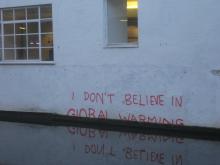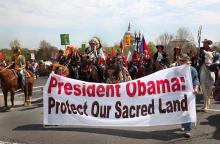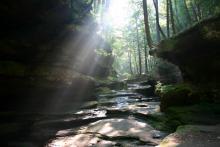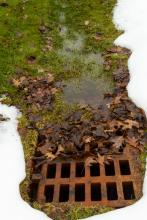Creation Care

This week the National Climate Assessment Report was released, documenting the disruptions already being experienced due to global warming. President Obama has tried to raise the alarm by talking about the Report with weather reporters in different cities.
What’s amazing to me are not the findings of the report. More flooding, extreme temperatures, drought, severe wildfires — these have been predicted for years. And the crushing effects of global warming around the world are felt most by the poor and marginalized.
On the surface, what happened on Saturday at the nation’s capital was not extraordinary — just another rally for another cause to call the president to add another item to his to-do list. It may have been noteworthy to watch thousands of people from across the country march for climate action and then hold hands in a circle, or to see farmers and tribal leaders lead the crowd on horses, or to hear singer-songwriter Neil Young speak. Still, to a spectator, the Reject & Protect march could have been dismissed as another gathering for hippies and treehuggers or another picture for Instagram.
To overlook the significance of the march, however, would do injustice not only to the events of last week but also to the history surrounding them.
On Tuesday, April 22 (Earth Day), 24 farmers, ranchers, and leaders of indigenous communities rode to Washington, D.C. on horseback to launch the Reject & Protect campaign: a call to President Obama to reject the construction of the Keystone Pipeline (KXL) in order to protect the lands, waters, and communities located along the proposed pipeline.
The arrival of the Cowboy Indian Alliance inaugurated a week of ceremonies, film screenings, meetings, and other events promoting the anti-pipeline movement and climate action.



Editor's Note: Today’s #EarthWeek action: Join us for a prayer conference call at 2:30 pm Eastern Time as we hear from the evangelicals standing against the Keystone XL pipeline, and pray a blessing over them and their work. Click here to RSVP.
Maybe I’m a near-sighted, Bible-thumping holy roller, but I can’t see angel wings flapping on oil executives. No doubt some are community pillars. They’re Little League umpires, tithers, and PTA volunteers. They’ve got lovely houses and manicured lawns.
But they’re also flawed like the rest of us, and their professional bias screens out the obvious: The proposed Keystone XL Oil Pipeline would do little good and could wreak enormous harm. I’m compelled to halt my timid thy-will-be-done prayers and join a band of evangelicals boldly pleading for the permit’s denial. We’ve even launched a Facebook page, called “Pray No KXL.”

Director Darren Aronofsky says he is not religious, and that his Russell Crowe blockbuster movie “Noah” is the “least-biblical biblical film ever made.”
But the strong environmental message of his film — which makes Noah a hero as a God-inspired steward of the earth — firmly roots itself in Scripture, Aronofsky told an audience of religious environmentalists on Wednesday. Many of them hope the message of the movie, which has grossed more than $300 million since its release on March 28, spurs more people of faith to work against climate change.
In “Noah,” Aronofsky said, he hoped to capture the beauty of creation, and to dramatize God’s dramatic decision to destroy it because of human sin. Noah, he said, “is saving the animals. He is not looking for innocent [human] babies. It’s about saving the animals.”

There’s an old hymn that many Christians have sung for nearly a century. “How Great Thou Art” celebrates the glory of God while considering, “all the works thy hands have made.” It reminds me of the psalm that reads, “The heavens are telling the glory of God; and the firmament proclaims his handiwork. Day to day pours forth speech, and night to night declares knowledge.”
Creation, therefore, is a witness to the wonder and awe of God. Although humanity has been given the honor of bearing God’s image, the earth shows God’s creativity and ingenuity. Over the years I’ve heard so many stories of people finding faith in God, not because of brilliant arguments, but because they are in awe of the complexity and glory of the created world.
But creation is not just a unique witness to God’s glory — it is, as the apostle Paul wrote, “groaning” waiting also for its redemption. This past Easter Sunday, Christians all over the world sang joyful songs of resurrection and renewal. Many of these songs proclaim freedom for all of creation — not just for humanity. One church I know of even sang “Joy to the World,” in celebration that the power of Christ’s resurrection extends “far as the curse is found.”
It’s hard to face, but humanity — image bearers of God — is largely responsible for destroying much of this great witness to God’s glory.

When God coupled the earth with the breath of eternity, our souls and the soil were fused and our destinies perpetually intertwined. While many of us have been taught that human beings have dominion over the Earth, we have not understood that what we do to Mother Earth, we do to one another and to God.
Dominion theology has led to domination, abuse, and destruction of Mother Earth and human communities. Every time we strip the land of its diversity, we strip a layer of humanity from our collective souls. Soil is also a community of diverse beings — some visible to the naked eye, some microscopic. A diversity of beings distinguish fertile soil from lifeless dirt. When industrial agriculture or chemical spills make these beings homeless, our soil becomes dust and is gone with the wind. Regardless of their visibility to the human eye, maintaining the homes of microbes intact, is what keeps the land fertile for growing crops which feed human beings. Adding microbes to “the least of these” who deserve our protection is truly an act of self preservation.
Respect and protection is a recurring casualty of dominion theology in that dominated land requires dominated people to work it. Plantations required slaves, and agribusiness requires exploited immigrants. Generational shame was whipped into the minds of enslaved Africans as their backs were abused in cultivating the land. Over the course of 400 years, a healthy relationship with Mother Earth was one of those legacies lost, stolen, or strayed for many African Americans. Restoring a healthy relationship with the land is a vital prerequisite for our urban youth to turn their food deserts into an oasis of food sovereignty.
Editor's Note: Want more ideas for how to celebrate Earth Week? Click here to sign up for Earth Week updates through Friday.
This week, we finally had some good news in the fight against climate change: President Barack Obama announced a further delay in the review process for the Keystone XL pipeline. The right thing to do is to reject the pipeline once and for all, but we all know politics is never that simple. The president says no decision will be made until the end of the year, which means the deadline comes after this year’s election. But the president isn’t up for re-election again, and protecting the environment should not be a partisan issue. All of us have a stake here.
We need more time, President Obama says, more reviews, more answers. But for Sojourners’ Rose Berger, who has been a leader in the faith community’s witness against Keystone XL, the answer has been clear for a long time.

The accelerated pace of climate change deterioration in recent decades is highlighted in the report by the Intergovernmental Panel on Climate Change that was released in December 2013. This report highlights the alarming rates of carbon emissions in recent years and the massive disruptions to the nature that occur as a result. It warns that the disruptions could affect all areas of life and endanger the world’s food supply itself. The worst is yet to come. All this might sound a bit apocalyptic.
Acts 2:14-32 posits a similar scenario. Luke’s Peter predicts the signs that will occur in the last days (vv. 19-20). The Sun will turn into darkness and the moon into blood. There will be blood and fire and smoky mist. Joel 3, Luke’s source text behind these verses, was intended as a warning about potential disturbances in the natural order. Joel posits such calamities as consequences of human wickedness and calls on the people to alter their ways. Peter warns that such last days are about to arrive. They will be marked by disturbances in the natural order and terrible signs that will precede the day of the Lord. Interestingly, people in Jerusalem have already witnessed such (un)natural phenomena during the death of Jesus (Luke 23:44-45).
Acts 2 parallels the account of disruptions in the nature with the account about the death of Jesus (2:19-24).

One of the best things about food and cooking is sharing. From devouring cheap local eats with best friends to inviting people over for dinner or hosting a full on party, food brings people together.
This week is Earth Week and as an intern community we are choosing to make concerted efforts to be greener in our choices to promote healthy bodies and ecosystems. This is the motivation behind Meatless Mondays. This global movement asks for restaurants, organizations, and individuals to go veggie on Mondays, being mindful of how our eating habits affect the globe.
 Editor's Note: Sojourners is celebrating Earth Week with a special message series every day next week. Click here to join us!
Editor's Note: Sojourners is celebrating Earth Week with a special message series every day next week. Click here to join us!
“Behold, I am making all things new!” says Jesus in the book of Revelation. It’s this spirit of hope and second chances that we celebrate at Easter time. Life triumphs over death and decay. We get a second chance.
But what about our planet? A cursory glance shows us that God’s creation could use some renewal.
Creation is definitely groaning. We’re losing species, spilling oil, and changing our climate at an alarming rate. We’re building sea walls and responding to pumped-up natural disasters. Energy companies are pushing for even more access to the fossil fuels that are harming God’s creation. Action from Congress seems far away, and moneyed special interests are working hard to block other kinds of action.
Ched Myers, Sara Stratton, Chris Grataski, and Sasha Adkins describe how they are connected to their local watersheds.

St. Bonaventure (d. 1274) once said, “Whoever is not enlightened by the splendor of created things is blind; whoever is not aroused by the sound of their voice is deaf; whoever does not praise God for all these creatures is mute; whoever after so much evidence does not recognize the Maker of all things, is an idiot.”[1]
If Bonaventure was right, then we’re all idiots.
The first time I travelled to Rome was an experience second to none. Never, in my young travels, had I ventured to a place so layered with history and significance around every corner that one literally couldn’t escape it. Even the Roman suburbs were historical. We were amped to see it all. Our approach was simple: we would incrementally make our way through the city over the course of 10 days with a plan that would make any explorer proud.
The sheer magnitude of historical and ecclesiastical sites to be seen in the city was overwhelming at best. Then it happened. I had a unique moment near the end of the trip. We’d been walking nonstop through museums, ruins, churches; we’d even heard the pope preach a sermon, when I started to lose my attention. Many travelers or art buffs will resonate with this — there came a point during our endless walk through Rome where I had seen so much beauty and splendor and history that I just started taking it all for granted. The last two days consisted of me walking around blindly and numbly, room-to-room, ruin-to-ruin, as though what I stood before was of little or no value.
I called it “beauty exhaustion.”

OUR LADY QUEEN of Peace church sits atop a low bluff overlooking the Army Navy golf course. This vibrant Arlington, Va. Catholic community has a history of staring hopelessness in the eye and declaring, “Not on our standing ground!”
Queen of Peace was founded by African Americans in the midst of virulent segregation. In the 1940s, Arlington’s black Catholics had to travel two hours by buses to attend a Mass where they were welcome. There was a closer church, but black Catholics were relegated to the back pew and prevented from receiving communion before whites. In 1945, 16 families pooled their money, hired a black real estate agent, and purchased small parcels of adjoining property under various names so as to not arouse suspicion. In an era when redlining and “neighborhood covenants” protected white enclaves and economic power, this was a courageous act. A little less than two acres—their standing ground—was purchased for $14,000. The bishop blessed Queen of Peace, Arlington’s first black Catholic congregation, on Pentecost Sunday 1947.
Now, nearly 70 years later, this multicultural community is asking a new question: With global temperatures rising and changes visible everywhere in nature, how do we face the truth of climate change?
During a speaker series in March focused on “the integrity of creation,” I encouraged them to overlap the ecclesial concept of “parish” with the ecological one of “watershed.” For life to persist, there must be living water. Scientists tell us that each watershed, no matter how small, is responsive to climate change. Since human activity has destabilized the climate, changing human activity is important in undoing the harm. And since the earth’s biosphere is made up of interlinked watershed communities, perhaps restoring our particular watershed is analogous to healing the earth at its “cellular” level, which would be a positive contribution.

As the Intergovernmental Panel on Climate Change (IPCC) releases a groundbreaking and comprehensive report detailing the impacts of climate change as “severe, pervasive, and irreversible,” young evangelicals across the United States are coming together to pray for urgent and responsible climate action to protect life and defend their future. Organized by the Young Evangelicals for Climate Action, the Evangelical Environmental Network, and Renewal: Students Caring for Creation, prayer events are being held across the Nation — and on more than 20 Christian campuses — in recognition of April 3 as the 2014 National Day of Prayer for Climate Action.
While evangelicals are not typically associated with climate action, YECA spokesperson Ben Lowe points out,“Climate disruption is not just a scientific or political issue — it’s first and foremost a moral issue and biblical issue … It’s about protecting life and, as evangelicals, we’re particularly concerned about the ways our pollution and political inaction is affecting the poor and those who are most vulnerable.”
Communities around the world are already experiencing the negative impacts of climate change. The new IPCC reports details how the poorest countries are being seriously affected by climate change, with severe consequences to global food security, human health, and economic development. The poor will not be the only ones influenced by climate change, as IPCC Chairman Rajendra Pachauri says, "Nobody on this planet is going to be untouched by the impacts of climate change.”
We have a responsibility to use the Earth's wealth relationally, not exploitatively.
If we seek to follow Jesus in context, nothing is more contextual than a watershed.
OUR HISTORY IS increasingly hostage to a deep and broad ecological crisis. Stalking us for centuries, it is now upon us in the interlocking catastrophes of climate destruction, habitat degradation, species extinction, and resource exhaustion. Some call it “peak everything.”
“All we have to do to destroy the planet’s climate and biota and leave a ruined world to our children and grandchildren,” concluded environmental policy analyst James Gustave Speth in The Bridge at the Edge of the World, “is to keep doing exactly what we are doing today ... to release greenhouse gases ... impoverish ecosystems and release toxic chemicals at current rates, and the world in the latter part of this century won’t be fit to live in.”
Our Christian faith and practice now unfold either in light of or in spite of this crisis. Our choice is between discipleship and denial.
Two trends among thoughtful Catholics, evangelicals, and other Protestants in North America over the last quarter century are helping awaken us to “response-ability” in the face of these inconvenient truths. One is the spread of contextual theology, which demands both analysis and engagement with social realities around us. The other is how “creation care” has gained broad traction among churches.
But these trends need to be integrated. Contextual approaches have tended to address social, economic, and political issues apart from ecological ones. And environmental theologies are not contextual enough: often too abstract (debating “new cosmologies”), focused on remote symptoms (tropical rain forests or polar ice caps), or merely cosmetic (“greening” congregations through light bulb changes while avoiding controversies such as the Keystone XL pipeline).
Our “all hands on deck” moment requires a practical approach that challenges and equips our churches to learn how to “serve and preserve” the earth (Genesis 2:15). The best way to do that is to focus on the particular places in which we dwell.